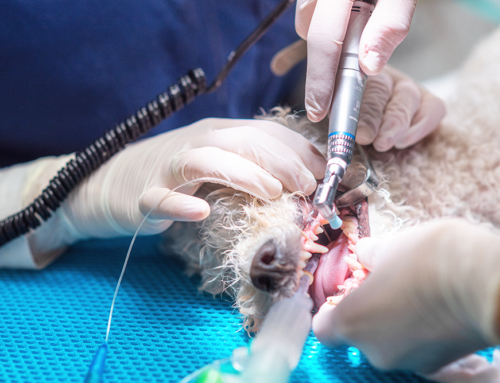When your dog has diarrhea, life is a mess, and you want answers—fast. Unfortunately, diarrhea can indicate a long list of health conditions, from simple stress, to chronic digestive disorders, to cancer.
How much diarrhea is too much? When to call the veterinarian
Because of diarrhea’s unpleasant, inconvenient, and odiferous nature, the problem inspires more veterinary appointments than probably any other clinical sign. However, a single episode isn’t always cause for concern, so Willow Wood Animal Hospital is providing a simple guide to help you determine when your pet needs veterinary care:
- Puppies — Diarrhea can rapidly dehydrate puppies and may indicate a serious viral infection, such as parvovirus or distemper.
- Senior dogs — Dehydration and serious underlying causes are also concerning for older dogs—especially those with pre-existing health conditions. Immunocompromised seniors are more susceptible to viral or bacterial infections.
- Persistent diarrhea — Unresolved diarrhea that continues for 24 to 48 hours needs attention.
- Bloody, black, or mucousy diarrhea — Abnormally colored stool can suggest gastrointestinal irritation, ulceration, or a more serious problem.
- Additional signs — Diarrhea accompanied by vomiting, lethargy, nausea, loss of appetite, or other clinical signs is also of serious concern.
Schedule an appointment if your dog meets any of the above criteria, and bring a small fresh stool sample for microscopic examination to the visit, if possible.
Five common diarrhea causes in dogs
Diarrhea is the result of a malfunctioning gastrointestinal tract (i.e., the stomach, small intestine, large intestine) and is categorized as large- or small-bowel diarrhea based on appearance, origin, and cause. To narrow down a potential cause, your Willow Wood Animal Hospital veterinarian will ask specific questions about your dog’s elimination habits (e.g., straining to defecate, having accidents in the home) and recent history, including lifestyle, activities, and diet. After a full physical examination and a fecal test to screen for intestinal parasites, the veterinarian will discuss their findings, propose additional testing, or provide a diagnosis, which may include one of these five common causes:
#1: Viral or bacterial infection — Various infectious microorganisms can disrupt the gastrointestinal tract, resulting in diarrhea and other clinical signs. Unvaccinated puppies and immunocompromised dogs are especially vulnerable to highly contagious viral diseases such as parvo and distemper—which can be fatal if left untreated. Bacterial infections (e.g., E. coli, Salmonella, Clostridium) or a healthy gut bacteria imbalance can occur in dogs who consume contaminated water, food, or undercooked meat. In some dogs, a hypersensitivity to Clostridium perfringens bacteria may cause a sudden, severe inflammatory condition characterized by vomiting and bloody diarrhea (i.e., acute hemorrhagic gastroenteritis [HGE]).
Veterinary treatment, including hospitalization for severe cases, is necessary for viral and bacterial infections.
#2: Dietary indiscretion, food intolerance, or sudden diet change — Some dogs seem to have an iron stomach and digestive tract, while others are sensitive to the slightest change. Dietary indiscretion describes the consumption of any food that is not normally part of the dog’s diet, such as table scraps, food wrappers, bugs, and dead animal carcasses. Rich foods can trigger small or large intestine inflammation (i.e., enteritis or colitis) and irritate the pancreas (i.e., pancreatitis—a painful condition that requires hospitalization).
Dogs may also experience diarrhea, often accompanied by vomiting, in response to food intolerance (i.e., food sensitivity) or a food allergy, which may appear at any point during a dog’s life, despite a long-term specific diet. Suddenly changing your dog’s food without gradually phasing out the familiar food can also trigger gastrointestinal distress.
#3: Digestive disorders — Autoimmune and inflammatory conditions can impair a dog’s ability to digest and absorb nutrition. Determining disease diagnoses requires extensive testing and imaging, and disease management is lifelong. Some examples include:
- Inflammatory bowel disease (IBD) — IBD is a group of inflammatory conditions that damage the intestinal lining and impair food breakdown and absorption.
- Exocrine pancreatic insufficiency (EPI) — EPI occurs when the pancreas cannot produce adequate digestive enzymes to supply the small intestine. EPI is most common in German shepherd dogs, although other breeds—especially in the herding group—can be affected.
- Lymphangiectasia — Swollen lymphatic vessels throughout the digestive tract cause protein loss, insufficient nutrition, and poor body condition, and fluid may accumulate in the chest or abdomen. Fortunately, this disease is uncommon.
#4: Stress and anxiety — Nervous, anxious, or distressed dogs may experience stress-induced diarrhea (i.e., colitis). Colitis onset is typically sudden and can be traced to a change in the dog’s internal or external environment. Common causes include:
- Travel
- Boarding
- Grooming
- New pet or person in the home
- Heat
- Loud events (e.g., fireworks, concerts, thunderstorms)
While stress is usually not considered good for your pet, some positive scenarios (e.g., a long hike at a new park when your dog is overactive and excited) can also cause colitis.
#5: Parasites — Microscopic parasites, including roundworms, hookworms, and whipworms, attach and feed in the pet’s intestines, damaging the cellular surface and, in severe cases, reducing nutrient absorption. Puppies are especially vulnerable to intestinal parasites, and most are born with roundworm infections. Fortunately, intestinal parasites are easy to diagnose and treat. Once the infection is resolved, a monthly heartworm disease preventive that contains a broad-spectrum dewormer can conveniently and continuously protect against intestinal parasites.
What to do if your dog is having diarrhea

Diarrhea is undoubtedly alarming and unpleasant, but mild acute gastrointestinal distress often resolves on its own. If your dog has diarrhea with no other signs, try feeding them small portions of a bland diet (e.g., plain boiled chicken and white rice). Encourage them to drink plenty of water and monitor them for worsening diarrhea or other signs. If their condition hasn’t improved in 48 hours, or they match the descriptions and signs listed above, contact our caring Willow Wood Animal Hospital team for an appointment.






Leave A Comment